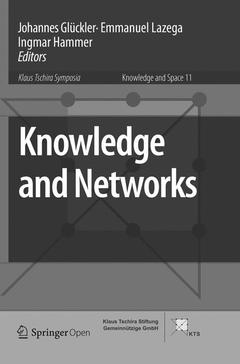Knowledge and Networks, Softcover reprint of the original 1st ed. 2017 Knowledge and Space Series, Vol. 11
Coordonnateurs : Glückler Johannes, Lazega Emmanuel, Hammer Ingmar

This book discusses a core question in many fields of the social sciences, namely how to create, share and adopt new knowledge. It creates an original space for conversation between two lines of research that have developed largely in parallel for a long time: social network theory and the geography of knowledge. This book considers that relational thinking has become increasingly important for scholars to capture societal outcomes by studying social relations and networks, whereas the role of place, space and spatial scales has been somewhat neglected outside an emergent geography of knowledge.
This book is open access, which means that you have free and unlimited access
Presents a novel theoretical and empirical insight in the geography of knowledge
Offers an original focus on the intersection of knowledge, social networks and space
Contributions by leading experts from multidisciplinary perspectives show how space and networks affect processes of learning
Date de parution : 07-2018
Ouvrage de 386 p.
15.5x23.5 cm
Date de parution : 01-2017
Ouvrage de 386 p.
15.5x23.5 cm



